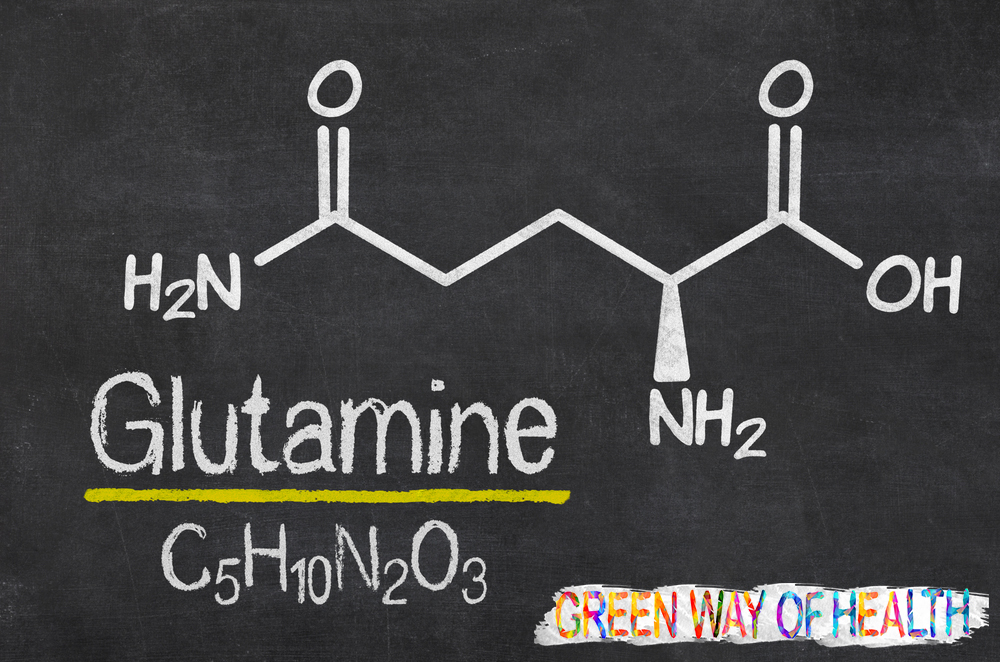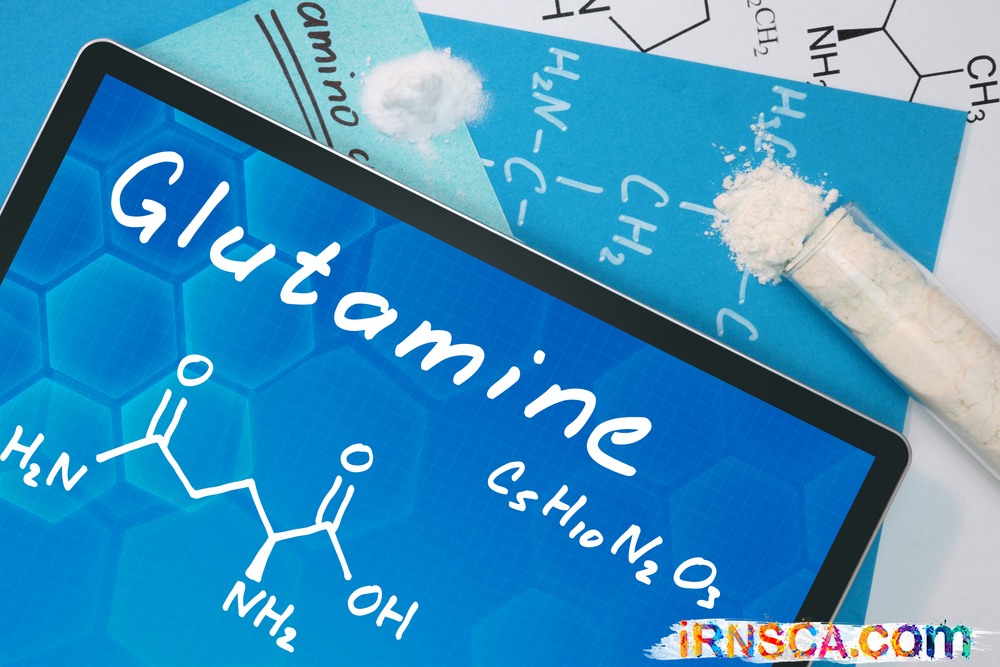What Are Glutamine Supplements?
They are products containing the amino acid L-Glutamine.
Glutamine is the most common amino acid found in your muscle tissues, and it plays a key role in the health of your muscles.
All amino acids, including glutamine, are considered “the building blocks for proteins”. Simply put, amino acids are compounds that combine to form proteins, and proteins are what allows our bodies to build and maintain muscle.
And since L-Glutamine is the most prevalent amino acid found in muscle tissue (over 60% of skeletal muscle is made up of L-Glutamine), the relationship between glutamine and healthy muscles has been the subject of a many study.
The amino acid plays a role in protein synthesis, the process your body goes through in order to effectively use protein. It also has anti-catabolic properties.
All the many benefits of glutamine, which we will discuss in detail below, are offered by both the naturally occurring amino acid (produced naturally in your muscles), and the glutamine supplements we’re here to talk about today.
So, if L-Glutamine is produced naturally in the body, why do you need supplements?
Because during intense exercise, glutamine stores are burnt up, lowering your natural glutamine levels. Your levels will slowly come back to normal, but that can take several days.
By adding a glutamine supplement to your diet, you can immediately replace those lost nutrients, thereby speeding recovery and keeping your muscles happy.

What Are the Benefits of Glutamine?
Some potential glutamine uses include:
Immunity
Glutamine plays an important role in the functioning of our immune systems. It serves as a fuel source for white blood cells, which help toward off disease and infection.
If the body needs more glutamine than is being consumed or produced naturally, it may begin to break down muscles to access protein stores of glutamine.
Also, it’s thought that the proper functioning of the immune system may be compromised when the body does not have access to sufficient levels of glutamine.
Thus, the relationship between glutamine and immune system health is closely linked.
However, most studies have looked at critically ill patients, and/or patients who have sustained serious injuries. There is little evidence to suggest that glutamine may boost immune function in otherwise healthy individuals.
More research is needed.
Wound healing
Glutamine is important for immune function, but it appears to be even more key when a serious wound, burn or other trauma is sustained. After a major injury, blood levels of glutamine tend to increase, potentially resulting in a depletion of glutamine stores.
For this reason, many medical professionals subscribe glutamine supplements following a serious burn or other wound.
Intestinal health
Glutamine also plays a role in our intestinal health. It is an energy source for many of the immune and intestinal cells that line our guts.
By supplying these cells with energy, glutamine helps to protect the health of your intestinal and immune systems. It’s therefore important for the normal maintenance and growth of intestinal cells.
Glutamine can also help strengthen the barrier between the inside of the intestines and the rest of the body.
This barrier is key because it helps prevent harmful toxins and bacteria from escaping the gut and entering the rest of the body.

Post-workout recovery
Some research suggests that glutamine may help to decrease muscle soreness after intense exercise and may also help to improve recovery.
However, other studies have contradicted these findings.
More research is needed.
Exercise performance & muscle growth
Because glutamine is a building block of protein, some have speculated that it may be involved in muscle gain and/or exercise performance. However, these effects have not been shown in clinical science.
One six-week study showed no difference in the glutamine group compared to the placebo group.
More research is needed.
Overall, glutamine supplements are well studied for several potential uses. Their applications in supporting immune and gut health are particularly well documented but their potential effects on exercise and muscle building need more research.
Who Can Benefit From Glutamine?
These groups may benefit from supplementing l-glutamine:
* Weightlifters – the #1 group of people who should be taking glutamine are bodybuilders and weightlifters. As we mentioned before, the muscles naturally produce and store large amounts of L-Glutamine. However, during intense exercise, these stores are depleted. Supplementation can quickly and efficiently replace these levels, restoring a natural balance. Glutamine can help decrease post-workout recovery time, and ensure that your muscles have what they need to heal and rebuild.
* Runners/endurance athletes – anyone who likes to run long distances or compete in any sort of endurance sports can benefit from glutamine. First off, glutamine products can help your muscles recover faster. Also, the amino acid has been shown to strengthen the immune system. Endurance sports temporarily weaken your immune system, so it’s important to do all you can to support your immune health if you like to run marathons or complete similar endurance activities.
* Anyone looking to lose weight – glutamine has been shown to increase HGH secretion, which can help to burn more fat, both during exercise and rest periods. It may also help to reduce sugar and carb cravings in some individuals.
* Men & women – both men and women can experience significant glutamine benefits. Unlike some supplements, these are not gender-specific, and can be beneficial for most people. Generally, we do not recommend taking ANY sort of supplement if you’re under 18 or without talking to your doctor first, but other than that most people can benefit from proper supplementation.

Are there Any Side Effects of Glutamine?
Most, if not all, supplements have some sort of negative side effects that you should be aware of.
Glutamine is no exception.
Side effects to look out for:
* Gastrointestinal issues, including gas, nausea, vomiting, etc.
* Muscle or joint pain
* Headaches, dizziness or tired feeling
* Mild rash or itching
This is not a complete list, as many potential side effects are possible depending on your body and the other medications/supplements you are taking.
Lastly, those with kidney disease or liver disease should generally NOT take glutamine supplements. Speak to your doctor if you’re unsure.
As with any supplement, it’s important to follow dosing instructions and never take more than recommended.
How Do I Take Glutamine?
If you’re wondering how to take glutamine or when to take glutamine supplements, this is the section for you.
First off, we always recommend following the instructions listed on the product packaging, at least when it comes to quantity. Do not exceed the daily recommended amounts unless otherwise instructed by a doctor.
As for when to take glutamine supplements, that depends on your reason for using them.
If you’re a weightlifter or athlete, a good time to take your dose is 30-60 minutes after working out, to help quickly replenish lost glutamine stores.
Another good time is right before bed, and right after waking up. Before bed is ideal because you increase HGH production while sleeping, and upon waking your muscles have been without nutrients for a solid 6+ hours.
If you’re wondering about glutamine dosage, most products list the serving size as around 5 grams.
Some fitness writers recommend taking 20-30g of glutamine a day. We don’t recommend you immediately begin taking such large doses, but rather work up slowly.
Also, you won’t need as much on days you don’t workout, so keep that in mind. It is not recommended to take more than 30g a day in order to stay on the safe side.
Lastly, keep in mind that L-Glutamine is commonly added to various fitness supplements, including pre-workouts, post-workouts, and more.
When calculating how much you should take, consider where else you may be getting this amino acid from.
And to clarify, we urge you to always speak with your doctor before taking any supplements featured on this website.
How Do I Pick a Good Glutamine Product?
In order to find the most effective glutamine supplement for you, there are several factors to consider. Let’s explore the things you should look for when choosing a product.
* Amount of glutamine – first things first, take a close look at the label of the product you’re considering to determine the amount of glutamine in each serving. Most products will contain a 5g serving size, while some are put into capsules and have smaller sizes (1g). Obviously the amount is important, as L-Glutamine is the key ingredient in these supplements.
* Other ingredients – what else is in the product? Many glutamine supplements will only contain L-Glutamine, but other products may contain a blend of ingredients intended to help boost the benefits of the supplement. BCAAs and other amino acids are common additions. Keep these extra ingredients in mind when making your decision. Depending on your needs and the current supplements you’re already taking, you may or may not need a product with additional ingredients.
* Brand quality – who makes it? Are they a well known and respected company? Do some research to determine who you’re buying from and what kind of company they are!
* Flavor – some products are flavorless, some are flavored. Pay attention to this, as it may affect your desire to actually consume the product! If in doubt, go with a flavorless version, or a version that’s prepackaged in capsules. Otherwise, read glutamine reviews to determine how people like the taste of various products.
* Value for money – lastly, consider the cost of the supplement. More specifically, consider the per serving cost of each supplement you’re considering. It’s not enough to just check the price of the container itself, as the number of servings per package varies greatly. Find a good, high quality product at a reasonable price, and you’re good to go!


